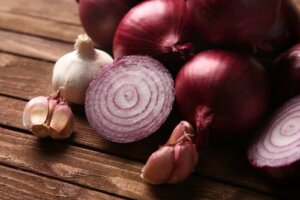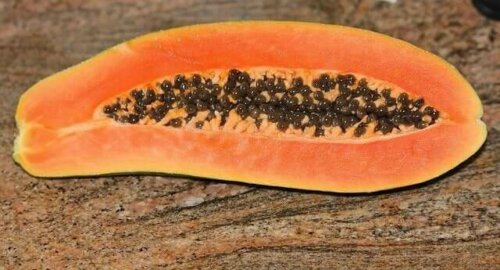Red Onion Remedies to Treat Intestinal Worms


Written and verified by the pedagogue in physical education and nutritionist Elisa Morales Lupayante
To treat intestinal worms it’s essential you visit a doctor and receive a precise diagnostic. Although some symptoms suggest there’s an infection, it’s not possible to start treatment until this is confirmed. Therefore, before trying any therapeutic option, it’s vital you receive professional medical attention.
According to specialists at Mayo Clinic, intestinal worm treatments can include antiparasitic drugs like Albendazole or Mebendazole. Similarly, your doctor may recommend you adopt some alternative hygiene practices to minimize the risk of contagion. But what more can we do?
Although we should prioritize medical treatment, we can use some remedies of a natural origin that seem to have positive effects when it comes to fighting this problem. Among the options, we find red onions. They’re known for their nutritional quality and properties.
What are Intestinal Worms?
Intestinal worms are organisms that affect the body of another living being, generated by digestive-level complications. According to the Journal of Health, Population, and Nutrition, it’s one of the most common infections in humans in developing countries.
A large number of the cases are caused by a parasite that’s commonly called Enterobius vermicularis. It’s also known as the pinworm, which is why this is sometimes called a pinworm infection.
Symptoms

The most common symptoms for people with intestinal parasites are constant abdominal pain, itchiness in the perineal area, and a swollen stomach or an excess of gas. However, they can also give you:
- Regular fatigue for no apparent reason
- Weight loss for no apparent reason
- Periods of diarrhea followed by constipation
- Changes in appetite – extreme or reduced hunger
- White spots in stools
- Very dark stools
5 Red onion remedies to treat intestinal worms
After a suitable diagnosis, and receiving the formula for medical treatment, ask your doctor if there’s you can use onion-based remedies to combat intestinal worms. If your doctor agrees, you can use them as a compliment.
The red onion in particular has been used in popular culture as an additional treatment to fight against parasitic infections. In fact, in a recent investigation called Anti-Parasitic Activities of Allium sativum and Allium cepa against Trypanosoma b. brucei and Leishmania tarentolae specialists noted the antiparasitic properties.
How can we take advantage of these properties? There are many homemade remedies that may be useful. However, you should remember that the supporting evidence about their safety and efficiency is limited. For that reason, use them with caution, just as complements to medical treatment.
1. Onion, garlic, and avocado salad
The sulfur compounds and flavonoids in red onion help to remove various harmful agents from the body. Combined with the garlic and the avocado they make a fantastic remedy to treat intestinal worms.
Ingredients
- 1 red onion
- 1 avocado
- 3 garlic bulbs
- Nuts (to taste)
- 10 squash or pumpkin seeds
Instructions
- Wash the onion and chop it finely.
- Open the avocado and chop it as you wish (slices, fingers, etc.).
- Crush the bulbs of garlic.
- Then, toast the pumpkin or squash seeds.
- Finally, mix all the ingredients together and add nuts to taste.
Discover more: What Causes Abdominal Swelling After Meals?
2. Onion juice to combat intestinal worms
Red onion juice is a great choice for accelerating intestinal transit because it quickly expels intestinal worms. Therefore, we recommend you consume a considerable amount of this bulb to combat intestinal worms.
Ingredients
- 6 red onions
- Water (as necessary)
Instructions
- First, chop the onions.
- Then, put them in a recipient big enough to cover them completely with water.
- Leave them to soak overnight.
- Drink a cup of onion water on an empty stomach.
- Repeat this for one week.
3. Milk infused with mint and onion

Milk infused with peppermint leaves and red onion is a great additional remedy to treat intestinal worms. Just make sure you continue to follow your medical treatment.
Ingredients
- 4 stems and 10 peppermint leaves
- 1/2 cup of skimmed milk
- 1 tablespoon of honey
- 1 red onion
Instructions
- Pour the milk and put the peppermint into a pan and bring to the boil.
- Finely chop the onion.
- Then, mix the onion with the mint and milk mixture.
- Lastly, add the honey to the other ingredients.
- Drink warm, one hour before breakfast. Repeat this for 7 days.
4. Papaya, rue, and onion juice to combat intestinal worms

The anthelmintic properties of rue are great for treating intestinal worms. Papaya also adds a large number of flavonoids which accelerate the process. Additionally, when adding red onion to the mix, you get a potent remedy for intestinal worms.
Ingredients
- 1 red onion
- 1 cup of water (1/2 pint)
- 1/2 tablespoon of papaya seeds
- 1 tablespoon of dry rue leaves
Instructions
- First, finely chop the onion.
- Then, cut the papaya in half and extract the seeds.
- Put the ingredients in a pan and bring to boil.
- Lastly, strain the mixture and drink warm, throughout the day.
5. Ragweed and onion tea
Ragweed has anti-parasitic properties that can be very useful. By combining them with the sulfur compounds and flavonoids of red onion, we get a powerful mixture to eliminate intestinal parasites. That said, you must avoid it if you are pregnant, breastfeeding, or you have any problems with your kidneys.
Ingredients
- 4 cups of water (2 pints)
- 1/4 chopped red onion
- 2 tablespoons of ragweed
Instructions
- Finely chop the quarter onion.
- Add it to the water and bring it to boil.
- After, add the ragweed to the boiling water.
- Leave to rest for 5 minutes.
- Strain and drink hot, 3 times a day.
Enjoy these remedies as a complementary treatment
If your doctor says it’s suitable, you can try these natural remedies with onion to combat intestinal worms. However, you should bear in mind that none of these can replace traditional medical treatment and you should always proceed with caution.
Follow the advice your doctor gives and maintain good life habits, and you’ll see that little by little you begin to get better. Give it a try!
All cited sources were thoroughly reviewed by our team to ensure their quality, reliability, currency, and validity. The bibliography of this article was considered reliable and of academic or scientific accuracy.
- Haque R. Human intestinal parasites. J Health Popul Nutr. 2007;25(4):387–391.
- Pandey, Palak & Mehta, Archana & Hajra, Subhadip & John, Jinu & Mehta, Pradeep. (2010). Anthelmintic activity of Ruta graveolens L. leaves extract. Medicinal Plants – International Journal of Phytomedicines and Related Industries. 2. 241-243. 10.5958/j.0975-4261.2.3.039.
- Aparicio Rodrigo, M. (2011). Parasitosis intestinal. Pediatria Integral.
- Pérez-Molina, J. A., Díaz-Menéndez, M., Pérez-Ayala, A., Ferrere, F., Monje, B., Norman, F., & López-Vélez, R. (2010). Tratamiento de las enfermedades causadas por parásitos. Enfermedades Infecciosas y Microbiologia Clinica. https://doi.org/10.1016/j.eimc.2009.11.003
- Morhouse, C. H. (1952). Intestinal Worms. British Medical Journal. https://doi.org/10.1136/bmj.2.4794.1152-a
This text is provided for informational purposes only and does not replace consultation with a professional. If in doubt, consult your specialist.








